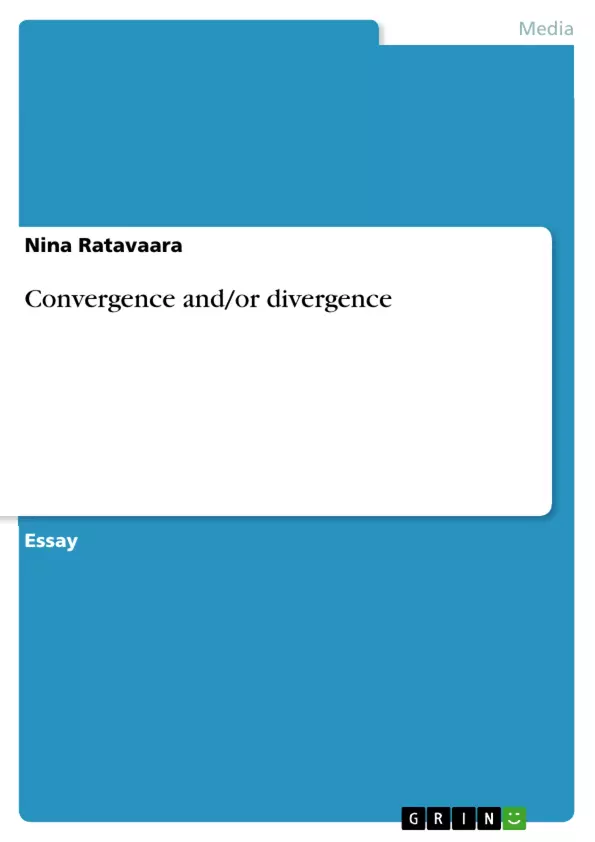It is not possible to avoid the two words convergence divergence in literature, discussions and theories about new media, new services, what the audience wants and the future of media nowadays as „convergence rapidly became one of the key concepts in new media discourse.”(Storsul/Stuedahl:2007:9) So it was mentioned in articles, academic texts, policy documents and industrial papers and was introduced as the new order. (Fagerjord/Storsul:2007:19) And in becoming a key concept convergence also became an important rhetorical tool that encouraged change in several fields e.g. grassroot journalism sites or media companies presenting new (future) plans for online platforms and mobile services. (Storsul/Stuedahl:2007:9) But even if the two words are omnipresent it seems as if not everybody is writing, meaning and talking about the same. Actually sometime when reading different articles and books it seems as the authors were writing and discussing totally different topics. Like Storsul and Stuedal describe it, convergence really is a buzzword.(Storsul/Stuedahl:2007:9) And it is not only a buzzword, but it bears the old human (science-fiction) visions and hopes of media enabling things being managed by one central system and/or device that organizes our whole life and we now can’t even think of. (Storsul/Stuedahl:2007:10)One very common though simple example of such futuristic thinking and visions might be the refrigerator that automatically and independently orders the needed food and drinks from the shop and they are also delivered automatically, maybe even beamed into the refrigerator.
Inhaltsverzeichnis (Table of Contents)
- Introduction
- Convergence and/or divergence
- Conclusion
- References
Zielsetzung und Themenschwerpunkte (Objectives and Key Themes)
This essay aims to explore the concept of media convergence and divergence, analyzing its diverse interpretations and implications for various aspects of media, including technology, industry, culture, and society.
- Different types and interpretations of convergence and divergence
- The impact of convergence on media consumption and production
- The evolution of media convergence as a process, not an endpoint
- The relationship between convergence and digitalization
- The role of convergence in shaping new media industries and cultural practices
Zusammenfassung der Kapitel (Chapter Summaries)
- Introduction: Introduces the concept of convergence and divergence as key terms in contemporary media discourse, highlighting its pervasive presence and varied interpretations. It also points to the evolving nature of convergence as a process and examines its potential implications for future media landscapes.
- Convergence and/or divergence: Delves deeper into the concept of convergence, exploring various types and interpretations offered by different scholars and theorists. It analyzes the technological, market, receptive, and regulatory aspects of convergence, providing examples and insights into its diverse manifestations.
Schlüsselwörter (Keywords)
The main keywords and focus topics of this essay include media convergence, media divergence, digitalization, technological convergence, market convergence, receptive convergence, regulatory convergence, cultural convergence, and new media.
Frequently Asked Questions
What is the difference between media convergence and divergence?
Convergence describes the coming together of different media technologies and industries, while divergence refers to the emergence of new, specialized media forms and the separation of services.
Why is convergence considered a "buzzword" in media studies?
It is often used as a rhetorical tool to encourage change and innovation, though different authors often mean different things, ranging from technological to cultural shifts.
How does digitalization drive the convergence process?
Digitalization allows all forms of information (text, sound, video) to be translated into the same binary code, enabling them to be processed and transmitted by the same devices.
What are the main types of media convergence?
Scholars distinguish between technological, market (industry mergers), regulatory (laws), and receptive (user behavior) convergence.
Is convergence an endpoint or a process?
Most theorists agree that convergence is an ongoing process of change in how media is produced and consumed, rather than a final destination where all media becomes one.
- Quote paper
- Nina Ratavaara (Author), 2008, Convergence and/or divergence, Munich, GRIN Verlag, https://www.grin.com/document/178933



